Anikanya yantiyn, Amuwang-kinpa. Let me introduce myself. My name is Leila and I am a proud Wonarrua woman who works and plays on Awabakal, Worimi and Wonarrua country. I have three boys and a cat. I try to connect with Country on a daily basis, grow native plants to cook with, weave, and nothing makes me happier than to be with family. I am an Aboriginal woman first, and am never far from my mob. I just also happen to be a Fellow of RANZCOG.
To be clear, this article by no way is reflective of all First Nations people’s experiences in training – as I am sure you are aware, we are not a homogenous group. We are all so very different, yet innately there are similarities.
Personally, I grew up in a single-parent family with five siblings and a mother who regularly struggled to ensure we had food and a home with electricity. ‘Poor’ would be an understatement and ultimately, at the age of 15, I was kicked out from the two-bedroom apartment housing the seven of us (including my sister’s children resulting from a teenage pregnancy), where I was forced to find a path for myself. My childhood was entangled with poverty, surrounded by drug abuse and criminal behaviour. However, my parents taught me two clear things: resilience and perseverance.
I got a place, finished school and was offered entry into a university degree. Did I know why I was going to university? Not really, just that this whole poverty thing wasn’t all it was cracked up to be and university would help get me out of it. Education mattered. And there I found a new mob, my university mob at Wollotuka at the University of Newcastle. With them gently pushing (an oxymoron I know) me into new open doors, I got into medicine. Throughout my medical degree came a few more life hurdles in the form of an unplanned pregnancy and sadly, domestic violence (a situation known all too well to many First Nation women).
The life lessons leading me to my current career really started growing at this time. What I had the unpleasant experience to learn was, that if you were a young Aboriginal woman, you were treated different. And if you had domestic violence added, you got to learn the unfortunate reality that the law and supports for domestic violence at that time were turned more toward you than the perpetrator. The shame this comes with is unfathomable.
I learnt that my voice wasn’t important, that even if you were smart and capable you would be judged. And if you were able to hide your Aboriginality, you should.
I got through that dark space and started working. But ever more, obstetrics and gynaecology was calling, until I inevitably started training. This was thrilling, spectacular and all kinds of “How in the hell am I going to do this?” There were several clear things to overcome:
- Financial
- Workload
- Sorry business
- Family emergencies
- Racism and discrimination
Financial barriers were clearly the most difficult. I did not come from a family with any money and had children to provide for. So any extra courses, books or resources were already out, even if this put me behind my peers. That left the minimum financial expectations the College has, annual fees and mandatory courses. Covering this required selling things I owned, borrowing off dear friends and at the end, accepting the added late fees that came and begging for payment plans. Let me tell you the effect on one’s wellbeing when you have to apply for a payment plan and have to tell strangers the personal details of why you’re broke. It is mortifying. Fortunately, payment plans for training fees are now offered to all trainees to reduce this financial burden.
In regard to workload, well this was excessive but something I was good at until it came to exams. I actually was so afraid of judgement that some of my seniors had no idea I had three kids at home. I didn’t want to be seen as not taking the training seriously, or that I was going to require excessive time off. I didn’t want to be that registrar who is a burden on the team. This in hindsight was the most ridiculous part of my training experience. This was the College for women’s health after all, and if anyone would be advocating for women, it’s us. I am so proud of changes the College has made like fractional FTE, no mandatory 1st year continuous training, and all the other things that are making training for women easier. I still, however, find the strain we can put on our trainees to work and pass exams to be something we should aim to be better at.
Sorry business, for those that don’t know, is the mourning period when a family member passes away and all the following required responsibilities in accordance with traditional custom. Why is this a thing likely to affect training? Well, Aboriginal and Torres Strait Islander peoples die much younger than our non-Indigenous counterparts, so during training there are a significant number of times sorry business will likely interfere with training. This also includes the fact that interpretation of family isn’t nuclear. During my training, I lost both my grandparents, mother and then recently, in my first year as a consultant, my father. When you include uncles and cousins, there is an added level of stress. And lastly, the way in which our family members may pass is also likely to be traumatic. A cousin committed suicide, and my father fought a slow battle with dementia and bladder cancer. Competing obligations between training, work and to mob pulling in opposite directions brings a lot of trauma and shame. I missed part of my grandmother’s funeral. I am deeply ashamed of this and will likely not forgive myself. My life expectancy is projected to be substantially shorter than my non-First Nations colleagues, meaning I’m already past my middle age and family time is so precious.
This leads into family emergencies – the range and diversity of what can go on in my family never ceases to amaze me. And as the only university-educated family member with a steady income, this can come with its own difficulties. Mental health crises, health scares, accidents and requests for assistance can be a regular occurrence. Things many of my colleagues fail to understand at times but are part and parcel of coming from a low socioeconomic background.
Racism. This is really the only word I’ve ever seen cause a whole room of white people to become visibly uncomfortable. I am a facilitator of AIDA Cultural Safety training and it is a passion for me to help people assess their unconscious bias and how to improve. A lot of the time, being non-First Nations grants people a level of comfort, being in the position of privilege. Helping people to acknowledge this is powerful. It allows them to see themselves as responsible for equality for all Australians.
We as First Nations people unfortunately can be left in a perpetuity of discomfort. I am tan at best. The most common racism I encountered during training was regarding this and the ongoing racist implications of blood quantum. So many times I just attended the downward gaze and changed the subject, or having to justify to a non-First Nations person my Aboriginality and identity. Utterly exhausting. But, when a fellow trainee asked, “How did you prove you are Aboriginal, because that gets you lots of points?” I found being silent was no longer an option. The lack of cultural education amongst the medical community is obvious and abhorrent. It is also not the responsibility for First Nations people to educate our peers on a daily basis. Australia has a black history, and its lack of acknowledgement is strongly prevalent, which feeds into the chronic disparity of poor outcomes and mistreatment in health.
To illustrate the inconsistencies, historian Peter Read has offered the following conflation, drawing on documented sources:
“In 1935 a fair-skinned Australian of part-indigenous descent was ejected from a hotel for being an Aboriginal. He returned to his home on the mission station to find himself refused entry because he was not an Aboriginal. He tried to remove his children but was told he could not because they were Aboriginal. He walked to the next town where he was arrested for being an Aboriginal vagrant and placed on the local reserve. During the Second World War he tried to enlist but was told he could not because he was Aboriginal. He went interstate and joined up as a non-Aboriginal. After the war he could not acquire a passport without permission because he was Aboriginal. He received exemption from the Aborigines Protection Act and was told that he could no longer visit his relations on the reserve because he was not an Aboriginal. He was denied permission to enter the Returned Servicemen’s Club because he was.”
I could list a million things that helped me get through, but it was my fellow doctor mob who got me there. I am so incredibly lucky to have trained in HNELHD with so many other First Nations women, friends, mentors, and the unwavering support of Dr Marilyn Clarke. This new O&G family surrounds me with support to this day and I hope I have provided the same support for them, which I intend to continue as a Staff Specialist.
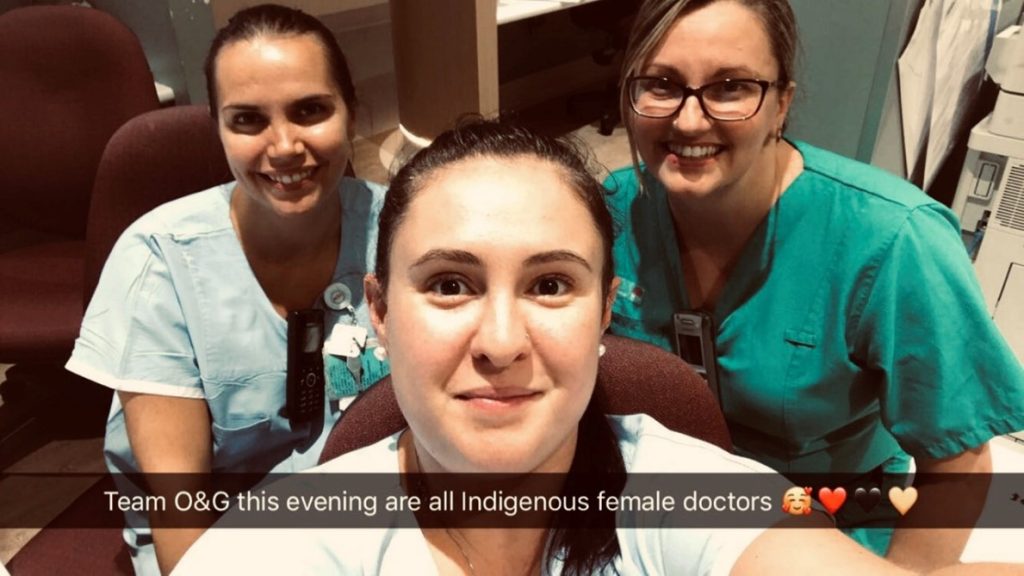
My ‘doctor mob’: with Dr Jessica Webb, Dharuk woman (5th year trainee) and Dr Nicole Whitson, Gomeroi woman (1st year)…
If you made it this far, thank you. The overall take home message is – First Nations trainees are an invaluable investment. They are able to support First Nations women and their families on a much deeper level, emotionally and culturally. The positive effect we can have on our communities can be exceptional, which I have experienced firsthand. Closing this immense cultural gap and improving health disparities for our women is a crucial priority. Improving obstetric outcomes leads to improved perinatal and childhood outcomes. It starts with our mothers and their babies. Supporting our First Nations trainees through their RANZCOG training to Fellowship is an urgency that must be championed by the College and its members.
I feel very privileged to be in the position I am as an Aboriginal RANZCOG Fellow, but also extremely proud of my journey and the resilience I hold.
No shame.
Dr Usher is the founder of the Awabakal AMS Maternity and Gynaecology Continuity of Care model. She is currently Acting Head of Department, New Maitland Hospital, as well as a staff specialist at John Hunter Hospital, and an AIDA Cultural Safety Facilitator.
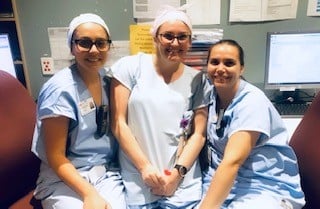
…with Dr Webb and Dr Rhiannon Potter, Kamilaroi woman (1st year trainee)…
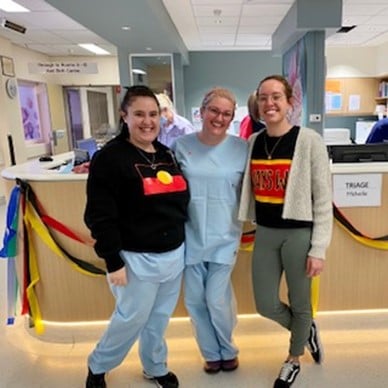
… and on the ward with Dr Whitson and Dr Erika CB Atkinson, Gomeroi and Ngurrabul woman (3rd year trainee).
Our feature articles represent the views of our authors and do not necessarily represent the views of the Royal Australian and New Zealand College of Obstetricians and Gynaecologists (RANZCOG), who publish O&G Magazine. While we make every effort to ensure that the information we share is accurate, we welcome any comments, suggestions or correction of errors in our comments section below, or by emailing the editor at [email protected]. Those pictured have provided consent for their name and image to be included.


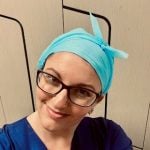
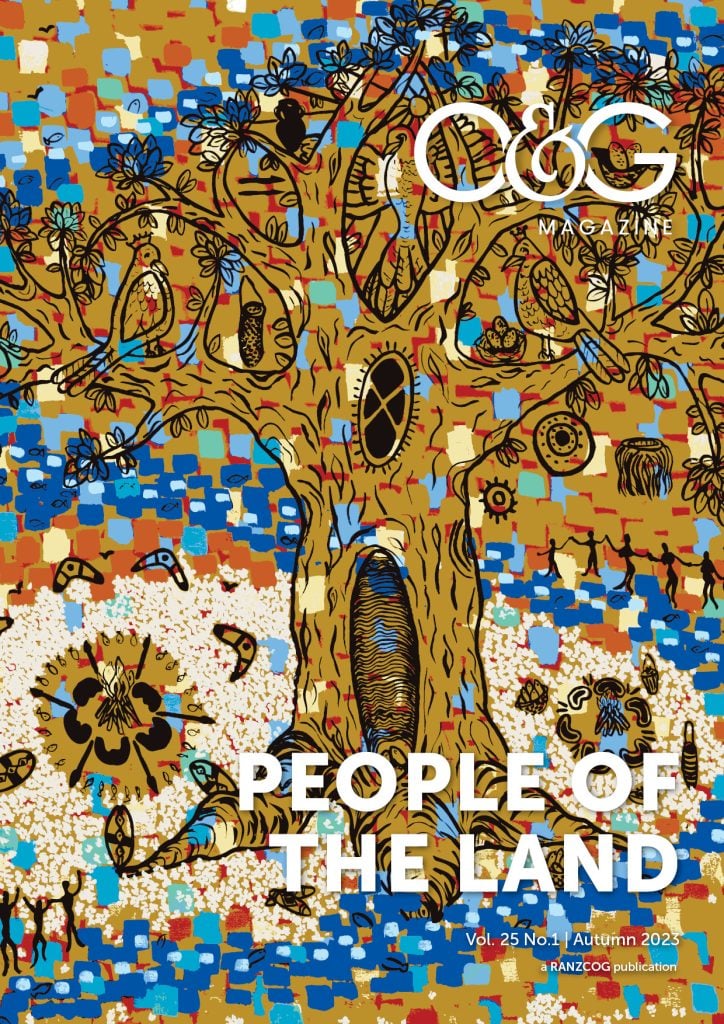


Inspiring